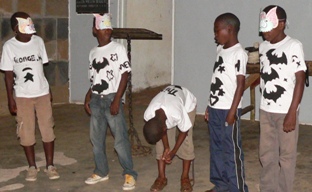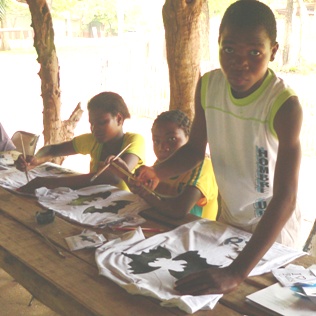Posted on December 10, 2010
Ms Rudi Horak, Manager of the Sci-Enza Science Centre recently travelled with six students all the way to Mpumalanga with the mission to teach learners from the Thada Primary School in Hectorspruit all about bats.
Sci-Enza, the interactive science centre of the University, has been involved with the “Amalulwane Project”, a bat conservation programme in the Malelane region since 2004. The Malelane region also known as Nkomazi, is well known for its sugar and citrus industry but also an area where many bats can be found. Some people believe that the name Malelane is derived from the Swazi word “amalulwane” which means “many bats”. The importance of bats is often overlooked, as most people do not realise that the majority of bats are insectivorous. There are approximately 78 species of bats in southern Africa. In the Lowveld, 49 species of bats have been recorded. They are highly developed little mammals, which can live up to 20 years and can consume thousands of insects per night.
Bats normally roost in caves, under bark of trees and in big leaves. In the Malelane area agricultural crops such as sugarcane and citrus replaced their natural roosting places. Buildings resemble caves in many ways and bats readily exploit suitable buildings. Most buildings in Malelane have bats in the roofs and as a result bats are perceived as a nuisance. Furthermore, in most cultures bats are seen as evil, fearful creatures and are often connected with superstition and delusive concepts. Since bats are protected animals in South Africa, Sci-Enza identified the need to educate the Nkomazi community about the important role bats play in nature and identified six schools to be part of the Amalulwane project. As all these school have buildings that are invaded by bats, three different bat houses were donated to each school to provide alternative roosting places for these bats. As the bats moved into the bat houses, the roofs of the buildings have been fixed and sealed off where the bats entered into the ceilings. Annually, Sci-Enza staff visits these schools to check up on the bat houses, to assist the educators with this bat project at their schools and give advice to integrate the bat theme in all learning areas.
An annual “Bat Camp” is also part of the engagement to teach the children the important role that bats play in the environment. This year, a total of 40 Grade 6 learners from the Thanda Primary school were invited to the Amalulwane camp.

Doing the "Bat rap"...
After settling into their sleeping quarters and lunch, Mohlamatsane Mokhatla, a entomologist kicked off the day with a presentation on the different types of insects (bat food). The excitement in the learner’s faces was very evident as they could not believe that there is a scientist who specialises in insects and helping them to catch as many insects as possible. The discovery of the biggest dung beetle everyone has ever seen before and the more than hundred different insects collected in just an hour, created the atmosphere to learn more about the environment. However, after dinner when it was already dark outside, terror from the learners was heard through their screams when Boitumelo and Dineo started to perform their bat puppet show. This informal and fun show gave them a glimpse into the importance of having bats around their area. The ultimate link in the importance of bats was cemented via a bat presentation and slide show by Rudi Horak, the Amalulwane Bat project leader.
The activities planned out for them for the rest of the weekend were very hands-on. This included making their own insect collection box, crossword puzzles, a math activity which linked the numbers of insects consumed in an hour to the number of insects that bats consume in a day, a week to years. The learners also had a chance to be creative by doing bat art and craft activities such as bat origami, a bat-mask, paint their own Bat T-shirt, compose a bat rap song and be part of a bat science show. During meal times, the learners wanted to know more about other aspects of the environment. Having a geologist, plant pathologists an entomologist, an educator and a musician as interns facilitating the camp was very intriguing to them. Performing their “Bat Rap Songs” at the end of the camp was evident that these learners have taken bats into their hearts! The myth about bats has been removed in order to help protect the bat populations for the future!
The message to protect our environment was definitely taken serious by the learners from Thanda Primary School. The interns that facilitated the camp also took valuable life lessons home. Thina, a MSc Geology student had the following comment: “I must say as a student coming from the city, more of such projects are needed to give exposure to learners in disadvantaged communities to facilitate a bigger dream, a better life, a understanding to protect their environment and to let them know that they can be anything they want to be.”

Creating their own bat T-shirts.
Copyright © University of Pretoria 2025. All rights reserved.
Get Social With Us
Download the UP Mobile App